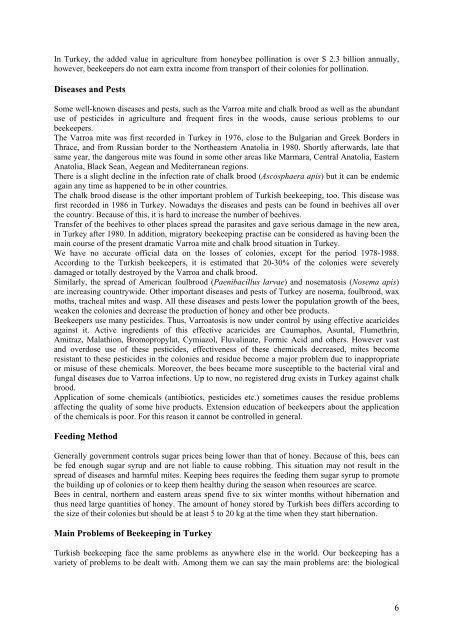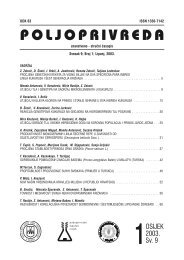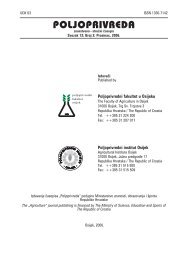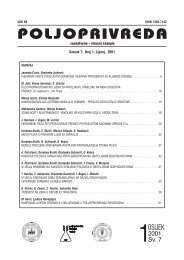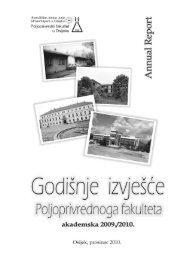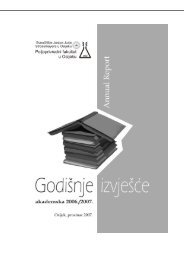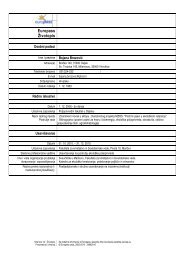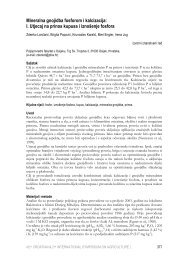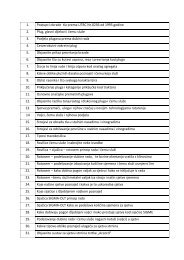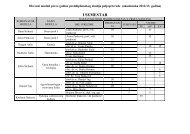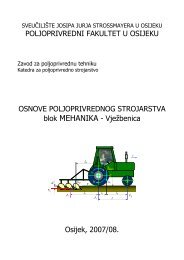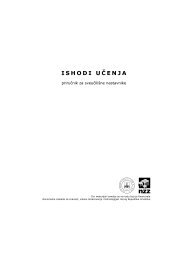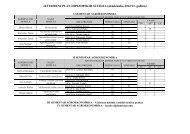1 THE GENERAL APICULTURAL SITUATION OF TURKEY ...
1 THE GENERAL APICULTURAL SITUATION OF TURKEY ...
1 THE GENERAL APICULTURAL SITUATION OF TURKEY ...
You also want an ePaper? Increase the reach of your titles
YUMPU automatically turns print PDFs into web optimized ePapers that Google loves.
In Turkey, the added value in agriculture from honeybee pollination is over $ 2.3 billion annually,<br />
however, beekeepers do not earn extra income from transport of their colonies for pollination.<br />
Diseases and Pests<br />
Some well-known diseases and pests, such as the Varroa mite and chalk brood as well as the abundant<br />
use of pesticides in agriculture and frequent fires in the woods, cause serious problems to our<br />
beekeepers.<br />
The Varroa mite was first recorded in Turkey in 1976, close to the Bulgarian and Greek Borders in<br />
Thrace, and from Russian border to the Northeastern Anatolia in 1980. Shortly afterwards, late that<br />
same year, the dangerous mite was found in some other areas like Marmara, Central Anatolia, Eastern<br />
Anatolia, Black Sean, Aegean and Mediterranean regions.<br />
There is a slight decline in the infection rate of chalk brood (Ascosphaera apis) but it can be endemic<br />
again any time as happened to be in other countries.<br />
The chalk brood disease is the other important problem of Turkish beekeeping, too. This disease was<br />
first recorded in 1986 in Turkey. Nowadays the diseases and pests can be found in beehives all over<br />
the country. Because of this, it is hard to increase the number of beehives.<br />
Transfer of the beehives to other places spread the parasites and gave serious damage in the new area,<br />
in Turkey after 1980. In addition, migratory beekeeping practise can be considered as having been the<br />
main course of the present dramatic Varroa mite and chalk brood situation in Turkey.<br />
We have no accurate official data on the losses of colonies, except for the period 1978-1988.<br />
According to the Turkish beekeepers, it is estimated that 20-30% of the colonies were severely<br />
damaged or totally destroyed by the Varroa and chalk brood.<br />
Similarly, the spread of American foulbrood (Paenibacillus larvae) and nosematosis (Nosema apis)<br />
are increasing countrywide. Other important diseases and pests of Turkey are nosema, foulbrood, wax<br />
moths, tracheal mites and wasp. All these diseases and pests lower the population growth of the bees,<br />
weaken the colonies and decrease the production of honey and other bee products.<br />
Beekeepers use many pesticides. Thus, Varroatosis is now under control by using effective acaricides<br />
against it. Active ingredients of this effective acaricides are Caumaphos, Asuntal, Flumethrin,<br />
Amitraz, Malathion, Bromopropylat, Cymiazol, Fluvalinate, Formic Acid and others. However vast<br />
and overdose use of these pesticides, effectiveness of these chemicals decreased, mites become<br />
resistant to these pesticides in the colonies and residue become a major problem due to inappropriate<br />
or misuse of these chemicals. Moreover, the bees became more susceptible to the bacterial viral and<br />
fungal diseases due to Varroa infections. Up to now, no registered drug exists in Turkey against chalk<br />
brood.<br />
Application of some chemicals (antibiotics, pesticides etc.) sometimes causes the residue problems<br />
affecting the quality of some hive products. Extension education of beekeepers about the application<br />
of the chemicals is poor. For this reason it cannot be controlled in general.<br />
Feeding Method<br />
Generally government controls sugar prices being lower than that of honey. Because of this, bees can<br />
be fed enough sugar syrup and are not liable to cause robbing. This situation may not result in the<br />
spread of diseases and harmful mites. Keeping bees requires the feeding them sugar syrup to promote<br />
the building up of colonies or to keep them healthy during the season when resources are scarce.<br />
Bees in central, northern and eastern areas spend five to six winter months without hibernation and<br />
thus need large quantities of honey. The amount of honey stored by Turkish bees differs according to<br />
the size of their colonies but should be at least 5 to 20 kg at the time when they start hibernation.<br />
Main Problems of Beekeeping in Turkey<br />
Turkish beekeeping face the same problems as anywhere else in the world. Our beekeeping has a<br />
variety of problems to be dealt with. Among them we can say the main problems are: the biological<br />
6


